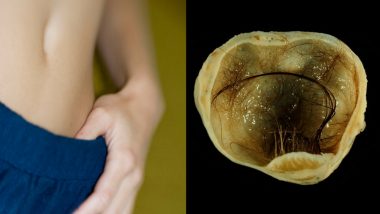Can period woes get any more heinous? A US woman, after suffering from inexplicably bad period pains since her early years, details her experience in Cosmopolitan, telling us how none of the gynecs she consulted ever took her seriously. It took her 17 years to find the right gynaecologist, who asked her to go take an ultrasound. The test results showed that there was a large cyst in her right ovary. But that's not the worst part. The growth on her ovary was not a regular cyst but a dermoid cyst. These cysts are commonly occurring ovarian tumours, which have the tendency to show up in a woman's 20s or 30s. What makes them sound like a crazy Frankenstienesque lab experiment is that these cysts sometimes have teeth, hair, bone, fat skin and eyes growing inside it -- a gynaecological horror story.
What's a Dermoid Cyst?
Dermoid cysts are also known as teratomas and are the commonest tumours that grow on the ovary. Although most women with dermoid cysts may not show any symptoms, giant ones, which measure more than 15 cm can cause a lot of discomfort. These cysts frequently contain skin, hair follicles, bones, teeth, sweat glands, sebum, blood, fat and cartilage. Apart from the ovaries, dermoid cysts also appear in the vagina, around the eyes and in the spine.
What Causes Dermoid Cysts?
Dermoid cysts form very early in our lives -- when we start developing as foetuses. Skin and skin structures get caught or trapped during foetal development. Dermoid cysts contain totipotent germ cells, which has the capacity to develop into any type of cells in the body which explains the bizarre content of these cysts. The cell walls of dermoid cysts are similar to those our outer skin and may contain hair follicles, sweat glands, teeth or nerves. They grow very slowly. Women who develop dermoid cysts on their ovaries don't realise until they are well into their 30s.
What are the Symptoms of Dermoid Cysts?
Dermoid cysts may not present any symptoms if they are small and are usually discovered by accident. But the larger ones can be painful and may show some of the same symptoms associated with regular ovarian cysts like bloating, a pressure in the lower abdomen, nausea, vomiting and sudden sharp pains.
What are the Risks of Ovarian Dermoid Cysts?
The commonest problem is the pain caused by torsion or twisting of the ovarian cyst. This can cause unbearable pain to the sufferer. When the ovary is twisted along with the cyst, it can cut off blood supply, causing serious harm to the organ. That's why infertility is commonly seen in such conditions. Sometimes, these cysts can rupture, causing its contents to spill into the abdominal cavity, which could be particularly painful and a risky situation.
How are Dermoid Cysts Detected?
Dermoid cysts, if growing internally, are usually detected by ultrasounds or MRI. But the true nature of the cyst may be completely understood during surgical procedures.
How are Dermoid Cysts Treated?
Although small ovarian dermoid cysts don't pose any problem or pain, it is not removed. But if the cyst is causing discomfort to the patient or compromising her fertility, it can be removed through a regular surgical procedure or through laparoscopy.
It's interesting to note that the word teratoma is derived from the Greek word 'teras' for monster. The hairy tumour covered by skin containing teeth does resemble an ugly monster in many ways. But despite its monstrous appearance, the tumour is benign.
(Reference: The Approach to Ovarian Dermoids in Adolescents and Young Women; A Huge Ovarian Dermoid Cyst: Successful Laparoscopic Total Excision)
(The above story first appeared on LatestLY on May 07, 2018 03:30 PM IST. For more news and updates on politics, world, sports, entertainment and lifestyle, log on to our website latestly.com).













 Quickly
Quickly


